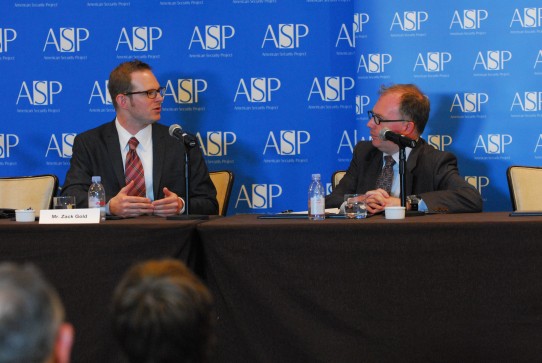
U.S.–Egypt Strategic Relations – Terrorism and the Sinai
On Wednesday, May 7th, 2014 leaders from the public and private sector in both the United States and Egypt joined together in Washington, DC to discuss the shifting nature of Egypt on a regional and international focus. These individuals specifically focused on the country’s partnership with the United States.
Terrorism and the Sinai
 Zack Gold, a Middle East policy analyst from the Brookings Institute, spoke on terrorism in the Sinai Peninsula at the American Security Project’s 21st Century U.S. – Egypt Strategic Relations conference on May 7th, 2014.
Zack Gold, a Middle East policy analyst from the Brookings Institute, spoke on terrorism in the Sinai Peninsula at the American Security Project’s 21st Century U.S. – Egypt Strategic Relations conference on May 7th, 2014.
In his presentation he spoke of the dramatic increase in violence in the Sinai since the popular uprisings that ousted Hosni Mubarak, as well as Mohammed Morsi.
Since 2011, 700 policeman, soldiers, and civilians have been killed, 500 of those occurred since 2013.
Mr. Gold lays out four reasons to explain the recent increase in violence in the Sinai: security forces melting away after Mubarak was ousted, recent mass jailbreaks of Salafi Jihadists, the release of detainees under the Supreme Council of Armed Forces and Mohammed Morsi, and the Libyan uprising that allowed for weapon stocks to be raided and smuggled into the Sinai.
The majority of the near daily attacks that occur are by disgruntled Bedouins and al-Qaeda inspired Jihadi groups who want to disrupt the relationship between Egypt and Israel.
One of the most notorious of these groups is known as Ansar Bait al-Maqdis (ABM), who take credit for the larger-scale attacks, such as the rocket-propelled grenade on an Egyptian helicopter that killed five soldiers last January.
The Egyptian response, according to Mr. Gold, has involved Apache helicopter attacks on villages and known terrorist hotspots, but is only a short-term solution that will only perpetuate grievances and inspire more violent attacks against the state.
In reference to the U.S. – Egypt strategic relationship, Zack Gold highlights a number of actions taken by the Egypt government in which the U.S sees as counterproductive. For example, banning the Muslim Brotherhood, essentially outlawing protests, the harassment of non-Islamists civil society organizations, and the detention of journalists, according to Mr. Gold, is very harmful for the strategic relationship.
Expanding Egypt’s war on terror to include war on political dissent has distanced the U.S. support for countering a terrorist threat in Egypt. Zack Gold concludes by reiterating the mutual concern of terrorism in the Sinai as an important issue for both Egypt and the United States, and should be a reason to strengthen the relationship rather than let it falter.
Created with Admarket’s flickrSLiDR.





